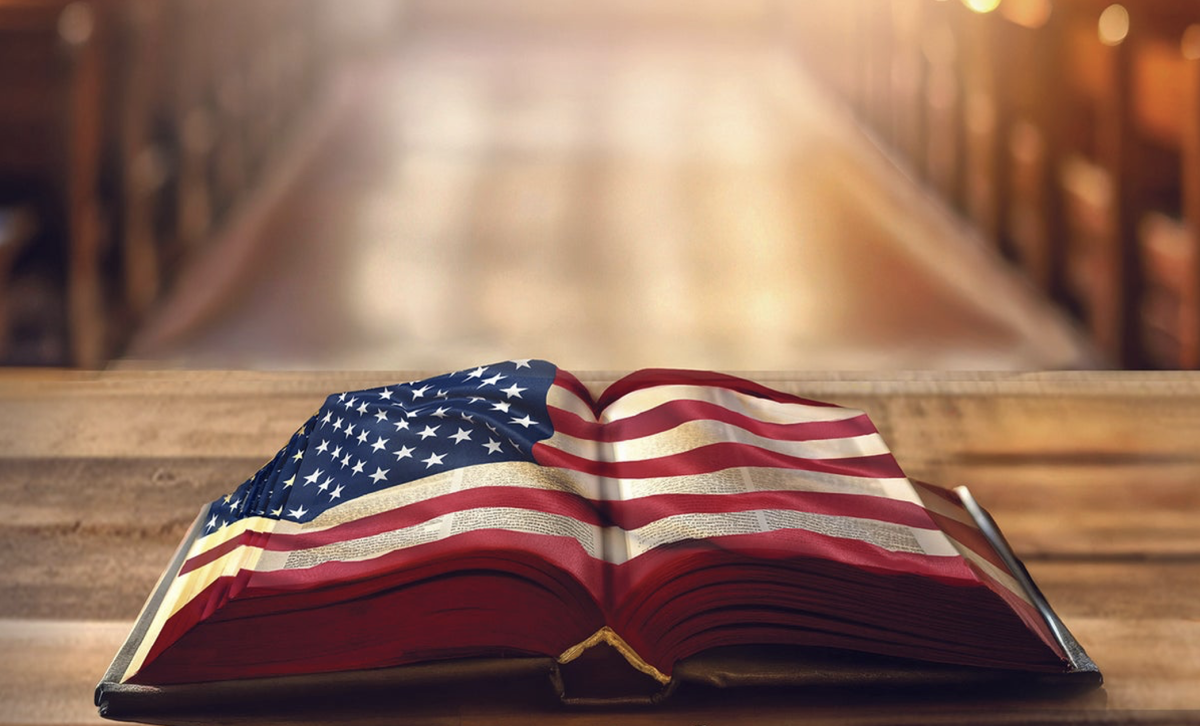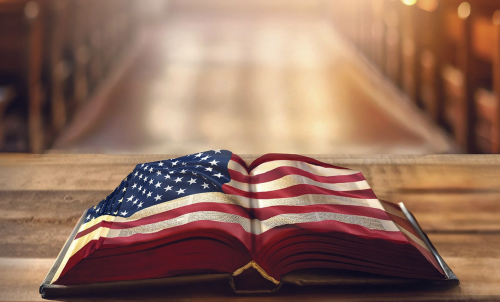

THE BIBLE ACCORDING TO CHRISTIAN NATIONALISTS: Exploiting Scripture for Political Power. By Brian Kaylor. St. Louis, MO: Chalice Press, 2025. 136 pages.
There is a debate that has been going on for years as to whether the United States of America is and/or was a Christian nation. Whether the Founders were Christian or not, the only thing the Constitution says about religion is that there should not be religious tests for political office (Article 6). As for the First Amendment, it stipulates that “Congress shall make no law respecting an establishment of religion, or prohibiting the free exercise thereof.” The meaning of this amendment is, of course, subject to interpretation. That said, there is a growing movement, especially among white evangelical Christians, that not only embraces the idea that the United States has been, since its founding, a Christian nation, but participants in the movement also seek political power to implement their vision for the nation. This is called Christian Nationalism. While Christian Nationalists believe that God wants them to impose their views on the nation, which has become increasingly diverse (a reality that many in this camp seek to overcome), there are others (myself included) who not only believe that the United States is a secular state but that the separation of church and state is good for both church and state. To say this doesn’t mean that people of faith cannot and do not bring their faith into the public square (see my book, Faith in the Public Square); however, seeking to impose one’s religion on others, essentially making them second-class citizens, is a different story.

Robert D. Cornwall
Numerous books have been written in recent years detailing the growth and influence of Christian Nationalism, something that comes in different forms. Among the authors of such books is Brian Kaylor, co-author with Beau Underwood, of the excellent book Baptizing America: How Mainline Protestants Helped Build Christian Nationalism (Chalice Press, 2024). Kaylor, a Baptist minister, serves as President and editor-in-chief of Word&Way.
In Baptizing America, Kaylor and Underwood demonstrate that Mainline Protestants embraced a form of Christian Nationalism long before the current crop of white evangelicals. They wrote that book to remind Mainline Protestants of their own participation in the linking of Christianity to the cultural and political identity of the United States, such that American civil religion has tended to take a mainstream Protestant style. Therefore, they used their book to suggest Mainliners get their house in order if they wish to truly resist the current forms of Christian Nationalism, some of which threaten to undermine the nation’s democratic institutions (by that I do not mean the Democratic Party but the nation’s governmental system). Kaylor’s The Bible According to Christian Nationalists serves as a follow-up to Baptizing America. In this book, Kaylor focuses on the way the Bible is used and misused to support the Christian Nationalist agenda. This agenda includes support for the Seven Mountains Mandate, which encourages Christians to take control of seven cultural elements in American society, including religion, media, education, government, entertainment, family, and the economy. Kaylor responds to this agenda by pointing out that “Christian Nationalism distorts scripture, twisting and molding and gerrymandering the sacred texts to fit a preferred political ideology” (p. 11). With that message in place, Kaylor begins this effort to expose the ways Christian Nationalism distorts scripture, focusing on seven different problematic approaches to interpreting and applying the biblical text.
The first chapter, which speaks of “Gerrymandering the Bible,” serves as an introduction to the book. The word gerrymandering is, of course, a political word that describes the way that politicians seek to define their voters rather than the voters deciding on who should represent them. The same is true of the way people engage with the Bible, seeking to organize scripture in such a way that it supports their agenda. An important contributor to the success of such efforts is the rampant biblical illiteracy among Christians, including evangelicals who claim to highly value scripture.
With this warning about the danger of gerrymandering the Bible in mind, Kaylor begins walking us through the seven problematic approaches to interpreting the Bible that undergird Christian Nationalism. The first of these seven chapters is Chapter 2, which is titled “The Bible as a Prop.” Kaylor begins this chapter by pointing to Donald Trump’s 2020 stunt when he walked to nearby St. John’s Episcopal Church for a photo op with a Bible. What Kaylor does is demonstrate that for many Christian Nationalists, the Bible is little more than a prop to be displayed but not engaged with. In essence, the Bible serves as an icon one carries around as a sign of their spirituality or perhaps as a lucky charm. One example of this use of the Bible is the effort to post the Ten Commandments in schools. Supporters of this effort suggest that this isn’t a religious effort, but rather an expression of America’s legal foundations. Kaylor notes how supporters insist that the Commandments will make American society better, such that “Lawmakers apparently think the Ten Commandments work like holding up a crucifix in a vampire novel” (p. 23).
The third chapter takes us into some rather strange territory. The chapter is titled “The Bible as Numerology.” In this chapter, Kaylor takes note of how some Christian Nationalists use biblical chapter and verse numbers to support their political efforts. One example that Kaylor points to is the use of Ephesians 6:11 as some kind of omen related to the attempted assassination of Donald Trump being part of God’s plan for America. Why this passage? Well, the gunshot took place at 6:11 in the evening. Since this verse speaks of the armor of God, this serves as biblical proof that God had protected Trump from harm because God had chosen him to be President. This is a message spread by many Christian Nationalists, including Charlie Kirk and J.D. Vance. Now, as a method of biblical interpretation, this makes little sense, as Kaylor notes, but it is popular in some circles. However, it is not good biblical interpretation. This isn’t the only such effort. One proponent of Christian Nationalism tried to find prophetic meaning in a Strong’s Concordance number. How the numbering system of the concordance could have prophetic meaning seems strange, but again, in some circles, it seems to make sense. Though, as one who has used Strong’s Concordance, I’m not sure how the numbering system could be divinely inspired!
In Chapter 4, Kaylor speaks to the problem of “The Bible as Selectively Literal” (chapter 4). In this chapter, Kaylor points to the inconsistent use of biblical literalism. We see this play out in several ways, including efforts by people such as the Speaker of the House, Mike Johnson, to find a biblical foreign policy for the United States, especially when it comes to the modern state of Israel. What he does here is point out the penchant among Christian Nationalists to make use of proof-texting to push their agenda.
Moving on to Chapter 5, we find Kaylor focusing on “The Bible as Triumphal.” Kaylor takes note in this chapter of efforts made by evangelical supporters to root Donald Trump’s presidency in the Bible. They have done this in several ways. Some suggest that the President is like King David, who, we’re reminded, was an adulterer but still a man after God’s heart. Others point to the story of Esther, such that Trump and others have been lifted up for “a time such as this.” Then there is the suggestion, mostly earlier on, that Trump is Cyrus. That was used largely when Trump first ran because many evangelicals weren’t sure that he was a Christian. Now, he is claimed as a good Christian, so new metaphors have been found to define his divinely authorized role.
When we turn to Chapter 6, we find Kaylor pointing our attention to efforts being made by supporters of Donald Trump and the Christian Nationalist agenda to suggest that “The Bible as Pro-America.” Even if the United States isn’t in the Bible (it didn’t exist as a nation during “Bible times), Scripture is used to describe the United States as a divinely blessed nation or that the country should return to its Christian roots (sometimes the term “Judeo-Christian” is used, but Judaism is usually an afterthought). So, in this chapter, Kaylor explores some of the passages used by Christian Nationalists and evangelicals to speak of the country in biblical terms. Among the passages used is Jesus’ word about a “city set on a hill,” which has long been used to speak of the United States. Another key passage is 2 Chronicles 7:14, which suggests that “if my people who are called by my name humble themselves … I will hear their voice ….” While this passage speaks of ancient Israel, in Christian Nationalist hands, it speaks of the people of the United States being God’s people. In essence, a Christian United States is the new Israel.
In Chapter 7, Kaylor speaks of “The Bible as Warfare.” He notes that Christian Nationalists often speak of God having a prophetic destiny for America. Donald Trump is usually standing at the center of this destiny. One of the most problematic expressions of this view is found in the use of the Old Testament figure of Jehu. Jehu overthrew the King of Israel, took over the monarchy, and then killed Jezebel. This has led to the idea that there is a ”Jezebel Spirit” in the nation that needs to be overcome. With that in mind, those who use this term have used it to describe “evil” female Democratic politicians, such as Kamala Harris, whom, at least metaphorically, Trump slays by defeating her in the 2024 election. Kaylor again points to the use of “armor of God” imagery to support these efforts. As part of this effort, we see support for the Second Amendment.
In his final Chapter (Chapter 9), Kaylor offers a response to these distorted uses of the Bible (and I didn’t cover everything Kaylor mentioned). He titles the chapter “A Non-Christian Nationalist Bible,” by which Kaylor, having shown how Christian Nationalists, most of whom are evangelicals, distort the Bible, encourages those who resist Christian Nationalism to bone up on the Bible. As he pointed out in chapter 1, one of the biggest problems on both sides of the debate is biblical illiteracy. He suggests that knowing the Bible can aid in resistance to Christian Nationalism, which will benefit both church and state.
We are fortunate that a growing number of authors, most of whom are scholars, have addressed the growth of Christian Nationalism and its threat to both church and state. Brian Kaylor’s book The Bible According to Christian Nationalists offers readers a very accessible and helpful guide to one aspect of the conversation about the challenges and dangers of Christian Nationalism to American democracy. That aspect is the use and abuse of the Bible in support of Christian Nationalism. He does so with a bit of humor!
This review originally appeared on BobCornwall.com.
Robert D. Cornwall is an ordained minister in the Christian Church (Disciples of Christ). Now retired from his ministry at Central Woodward Christian Church (Disciples of Christ) of Troy, Michigan, he serves as Minister-at-Large in Troy. He holds a Ph.D. in Historical Theology from Fuller Theological Seminary and is the author of numerous books, including “Eating With Jesus: Reflections on Divine Encounters at the Open Eucharistic Table” and “Second Thoughts About Hell: Understanding What We Believe” coauthored with Ronald J. Allen. His blog Ponderings on a Faith Journey can be found here.






